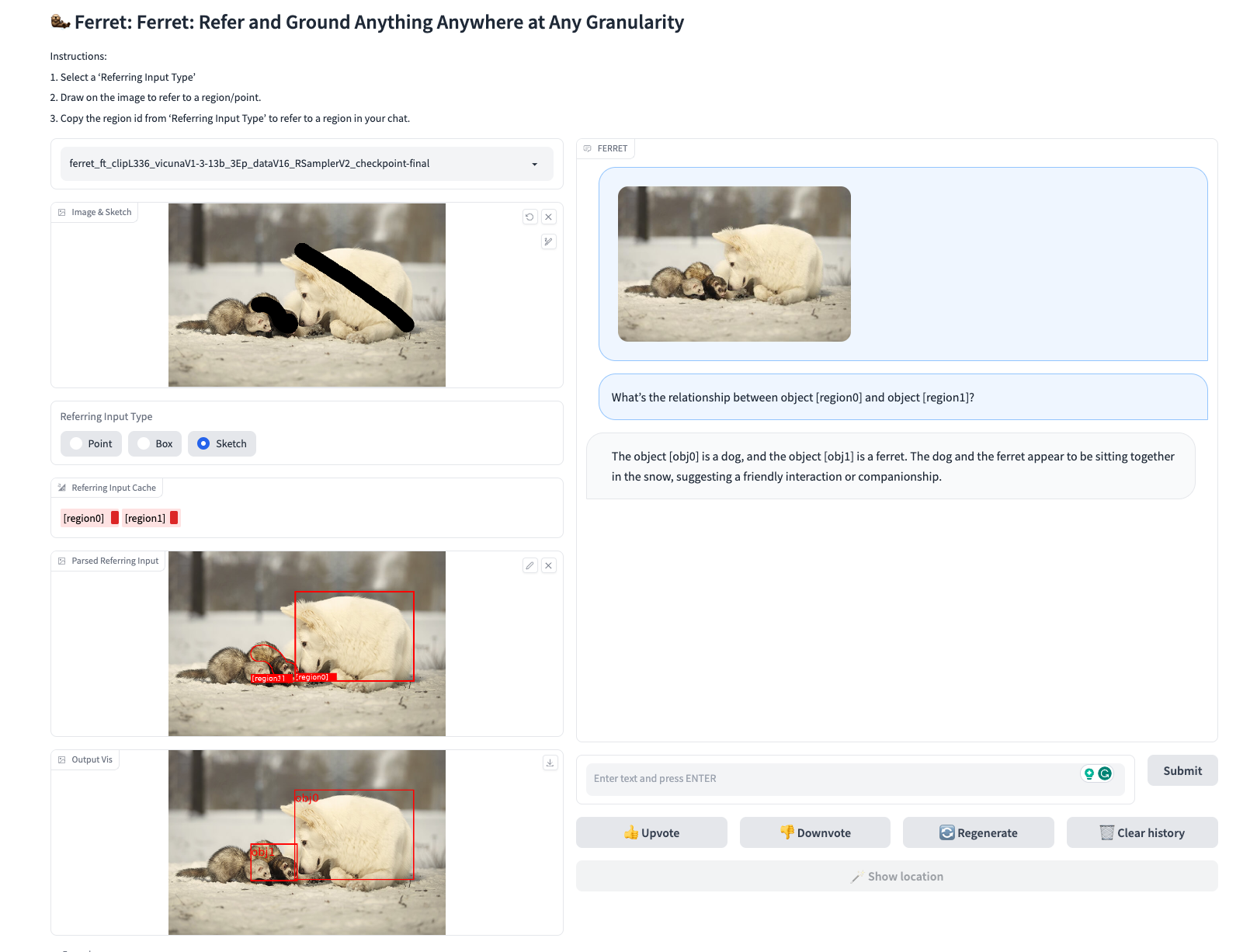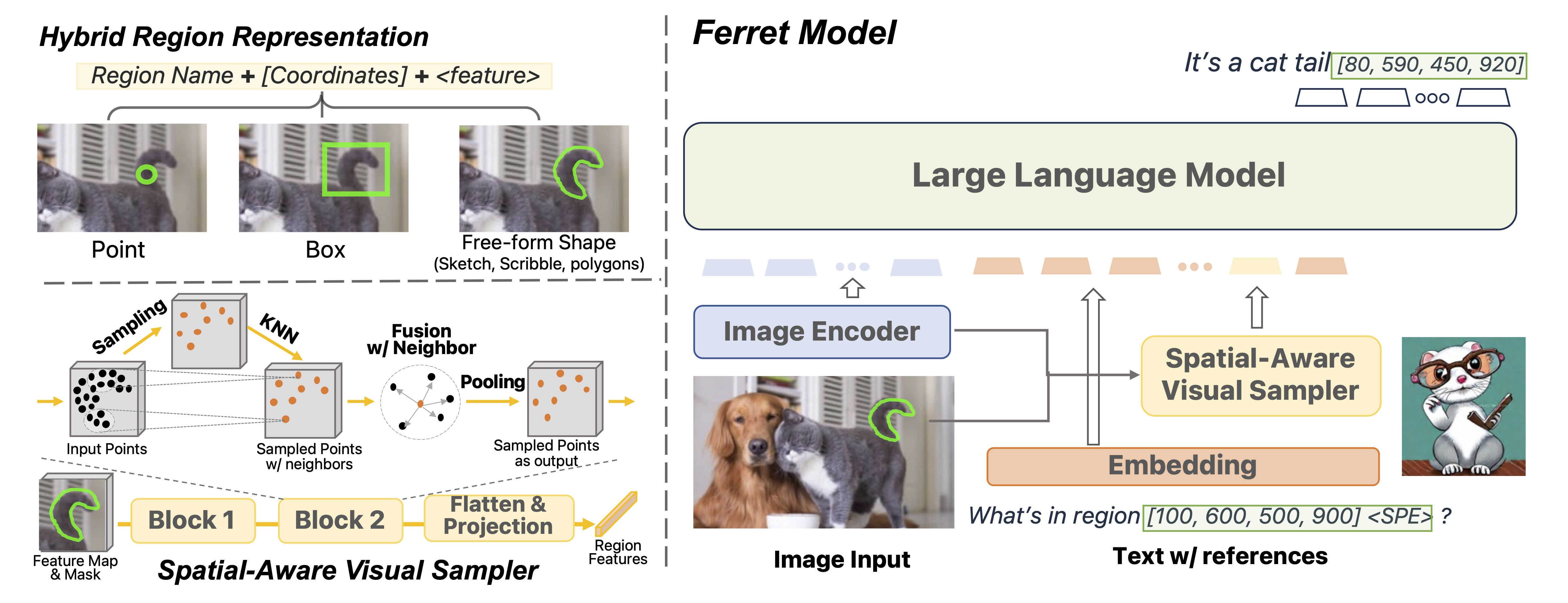An End-to-End MLLM that Accept Any-Form Referring and Ground Anything in Response. [Paper]
Haoxuan You*, Haotian Zhang*, Zhe Gan, Xianzhi Du, Bowen Zhang, Zirui Wang, Liangliang Cao, Shih-Fu Chang, Yinfei Yang [*: equal contribution]
- [10/08/2024] 🔥 We release the Ferret-UI, the first UI-centric MLLM that is capable of effectively executing referring, grounding, and reasoning tasks.
- [07/10/2024] 🔥 Ferret-v2 is accepted to COLM 2024.
- [02/15/2024] 🔥 Ferret is accepted to ICLR 2024 as a Spotlight!!!
- [12/14/2023] 🔥 We release the Ferret checkpoints(7B, 13B).
- [10/30/2023] 🔥 We release the code of FERRET model and Ferret-Bench.
Key Contributions:
- Ferret Model - Hybrid Region Representation + Spatial-aware Visual Sampler enable fine-grained and open-vocabulary referring and grounding in MLLM.
- GRIT Dataset (~1.1M) - A Large-scale, Hierarchical, Robust ground-and-refer instruction tuning dataset.
- Ferret-Bench - A multimodal evaluation benchmark that jointly requires Referring/Grounding, Semantics, Knowledge, and Reasoning.
Usage and License Notices: The data, and code is intended and licensed for research use only. They are also restricted to uses that follow the license agreement of LLaMA, Vicuna and GPT-4. The dataset is CC BY NC 4.0 (allowing only non-commercial use) and models trained using the dataset should not be used outside of research purposes.
- Clone this repository and navigate to FERRET folder
git clone https://github.com/apple/ml-ferret
cd ml-ferret- Install Package
conda create -n ferret python=3.10 -y
conda activate ferret
pip install --upgrade pip # enable PEP 660 support
pip install -e .
pip install pycocotools
pip install protobuf==3.20.0- Install additional packages for training cases
pip install ninja
pip install flash-attn --no-build-isolation
FERRET is trained on 8 A100 GPUs with 80GB memory. To train on fewer GPUs, you can reduce the per_device_train_batch_size and increase the gradient_accumulation_steps accordingly. Always keep the global batch size the same: per_device_train_batch_size x gradient_accumulation_steps x num_gpus.
We use a similar set of hyperparameters as LLaVA(Vicuna) in finetuning.
| Hyperparameter | Global Batch Size | Learning rate | Epochs | Max length | Weight decay |
|---|---|---|---|---|---|
| FERRET-7B | 128 | 2e-5 | 3 | 2048 | 0 |
| FERRET-13B | 128 | 2e-5 | 3 | 2048 | 0 |
Before you start, prepare our base model Vicuna, which is an instruction-tuned chatbot. Please download its weights following the instructions here. Vicuna v1.3 is used in FERRET.
Then download LLaVA's first-stage pre-trained projector weight (7B, 13B).
The scripts are provided (7B, 13B).
Please see this doc for the details.
We extracted the delta between our pre-trained model and Vicuna. Please first download weights of Vicuna following the previous instruction. Then download our prepared offsets of weights: 7B, 13B using wget or curl, and unzip the downloaded offsets. Lastly, apply the offset to the Vicuna's weight by running the following script:
# 7B
python3 -m ferret.model.apply_delta \
--base ./model/vicuna-7b-v1-3 \
--target ./model/ferret-7b-v1-3 \
--delta path/to/ferret-7b-delta
# 13B
python3 -m ferret.model.apply_delta \
--base ./model/vicuna-13b-v1-3 \
--target ./model/ferret-13b-v1-3 \
--delta path/to/ferret-13b-deltaNotices: Apple's rights in the attached weight differentials are hereby licensed under the CC-BY-NC license. Apple makes no representations with regards to LLaMa or any other third party software, which are subject to their own terms.
Please refer to the next section about how to set up a local demo with pre-trained weight.
To run our demo, you need to train FERRET and use the checkpoints locally. Gradio web UI is used. Please run the following commands one by one.
python -m ferret.serve.controller --host 0.0.0.0 --port 10000python -m ferret.serve.gradio_web_server --controller http://localhost:10000 --model-list-mode reload --add_region_featureThis is the worker that load the ckpt and do the inference on the GPU. Each worker is responsible for a single model specified in --model-path.
CUDA_VISIBLE_DEVICES=0 python -m ferret.serve.model_worker --host 0.0.0.0 --controller http://localhost:10000 --port 40000 --worker http://localhost:40000 --model-path ./checkpoints/FERRET-13B-v0 --add_region_featureWait until the process finishes loading the model and you see "Uvicorn running on ...". Now, refresh your Gradio web UI, and you will see the model you just launched in the model list.

Example of Ferret Interactive Demo.
If you find Ferret useful, please cite using this BibTeX:
@article{you2023ferret,
title={Ferret: Refer and Ground Anything Anywhere at Any Granularity},
author={You, Haoxuan and Zhang, Haotian and Gan, Zhe and Du, Xianzhi and Zhang, Bowen and Wang, Zirui and Cao, Liangliang and Chang, Shih-Fu and Yang, Yinfei},
journal={arXiv preprint arXiv:2310.07704},
year={2023}
}